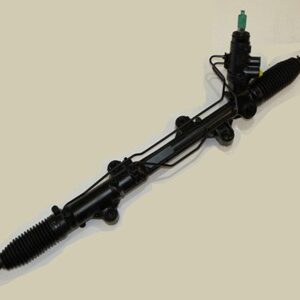In modern warehouses, factories, and distribution centers, forklifts are the backbone of material handling operations. Their reliability, efficiency, and performance play a major role in keeping workflows smooth and uninterrupted. At the heart of every electric forklift lies its most crucial component: the forklift battery. More than just an energy source, a high-quality forklift battery determines lifting power, runtime, operational efficiency, and overall cost management.
Whether you’re operating a small warehouse or a large industrial facility, choosing the right forklift battery can dramatically impact your productivity and long-term operational expenses. Understanding the types, benefits, and care requirements of forklift batteries is essential for making a smart investment.
What Is a Forklift Battery?
A forklift battery is a high-capacity industrial power unit designed to provide energy to electric forklifts. Beyond supplying electricity, the battery also acts as a counterweight, helping the forklift maintain balance while lifting heavy loads.
Forklift batteries are used in several types of equipment, including:
-
Electric forklifts
-
Pallet jacks
-
Reach trucks
-
Order pickers
-
Stackers
-
Narrow aisle lifts
These batteries come in different voltages, sizes, and chemistries depending on the equipment’s requirements.
Types of Forklift Batteries
There are two primary types of forklift batteries used in the industry:
1. Lead-Acid Forklift Batteries (Traditional)
Lead-acid batteries have been powering forklifts for decades. They are known for:
-
Affordable initial cost
-
Large capacity
-
Reliable performance
-
Wide availability
However, they require regular maintenance and come with some drawbacks:
-
Must be watered
-
Produce acid fumes
-
Long charging times
-
Need cool-down periods
-
Heavy and bulky
Despite these limitations, lead-acid batteries remain common due to their lower upfront price.
2. Lithium Forklift Batteries (Modern Technology)
Lithium batteries, especially LiFePO4 (lithium iron phosphate), have quickly become the preferred choice in industrial environments.
They offer numerous advantages:
-
Zero maintenance
-
Fast charging
-
Longer lifespan
-
Higher efficiency
-
Lightweight
-
No acid, fumes, or watering
-
Safe and stable chemistry
-
No cool-down period required
Lithium forklift batteries support multi-shift operations, making them ideal for demanding warehouses and 24/7 manufacturing facilities.
Why Forklift Battery Quality Matters
A forklift battery affects every aspect of warehouse operations. The right battery can:
1. Improve Productivity
Longer runtimes, faster charging, and consistent power output allow workers to complete tasks without interruption.
2. Reduce Operating Costs
Low-maintenance batteries reduce labor time and eliminate the need for special watering or ventilation areas.
3. Enhance Safety
High-quality batteries reduce risks of spills, fumes, corrosion, and overheating.
4. Extend Equipment Life
Stable power prevents damage to motors, chargers, and electronics.
5. Support Multi-Shift Operations
Lithium batteries enable opportunity charging, keeping forklift battery running across multiple shifts without downtime.
Key Features to Consider When Choosing a Forklift Battery
When selecting a forklift battery, consider the following factors:
1. Battery Chemistry
Depending on budget and usage:
-
Lead-acid is suitable for single-shift, low-budget operations.
-
Lithium is ideal for heavy-duty, multi-shift, or high-efficiency environments.
2. Voltage and Capacity
Forklift batteries typically come in:
-
24V
-
36V
-
48V
-
72V
Higher voltages deliver more power for larger forklifts.
Capacity (Ah rating) determines how long the battery will run before needing a charge.
3. Charging Requirements
Lithium batteries charge much faster and support opportunity charging, while lead-acid requires long charging cycles and rest periods.
4. Weight
The battery must match the forklift’s counterbalance requirements to maintain stability.
5. Battery Management System (BMS)
Lithium batteries should have a built-in BMS to protect against:
-
Overcharging
-
Over-discharging
-
Overheating
-
Short circuits
6. Maintenance Needs
Lead-acid batteries require frequent upkeep, while lithium batteries require none.
7. Lifespan and Cycle Life
Lithium batteries can last 3–4 times longer than lead-acid, lowering replacement frequency and long-term costs.
Advantages of Lithium Forklift Batteries
While both types of batteries have their place, lithium offers unmatched advantages for modern material handling:
1. Fast Charging
Lithium batteries can charge in 1–2 hours, eliminating downtime and supporting high-paced operations.
2. No Maintenance
No watering, cleaning acid residue, or equalizing charges.
3. Higher Energy Efficiency
Lithium batteries convert more energy into usable power, reducing electricity costs.
4. Longer Lifespan
Lithium batteries provide over 3,000–5,000 cycles, compared to 1,000 cycles for lead-acid.
5. Lightweight Design
Reduced weight improves handling and reduces wear on forklift motors.
6. Cleaner, Safer Operation
No toxic fumes, spills, or corrosion—ideal for indoor environments.
7. Consistent Power Delivery
Lithium provides full strength until nearly empty, while lead-acid loses power halfway through the shift.
Maintenance Tips for Forklift Batteries
For Lead-Acid Batteries:
-
Water the battery regularly
-
Clean terminals and check for corrosion
-
Avoid deep discharges
-
Allow proper cool-down time
-
Ensure proper ventilation during charging
For Lithium Batteries:
-
Use only the recommended charger
-
Avoid storing in extreme heat
-
Charge during short breaks to maximize uptime
-
Keep battery clean and dry
Lithium maintenance is minimal compared to lead-acid, making it the preferred option for busy operations.
Signs Your Forklift Battery Needs Replacement
Watch for the following warning signs:
-
Reduced runtime
-
Overheating during use
-
Slow charging
-
Frequent recharging needed
-
Strong sulfur smell (lead-acid)
-
Visible corrosion or leaks
-
Voltage dropping quickly under load
Replacing a worn-out battery restores forklift productivity and prevents equipment damage.
Why Forklift Batteries Are Critical to Warehouse Efficiency
Warehouses and factories depend on forklifts to keep the supply chain moving. A high-quality battery:
-
Reduces downtime
-
Supports heavy workloads
-
Boosts operational efficiency
-
Improves worker productivity
-
Ensures consistent lifting performance
As businesses push for faster delivery times and smoother logistics, reliable forklift batteries are more important than ever.
Final Thoughts
A forklift battery is much more than a power source—it’s the foundation of efficient material handling. Whether you choose traditional lead-acid or upgrade to advanced lithium technology, the right battery enhances productivity, improves safety, reduces downtime, and lowers long-term costs.


